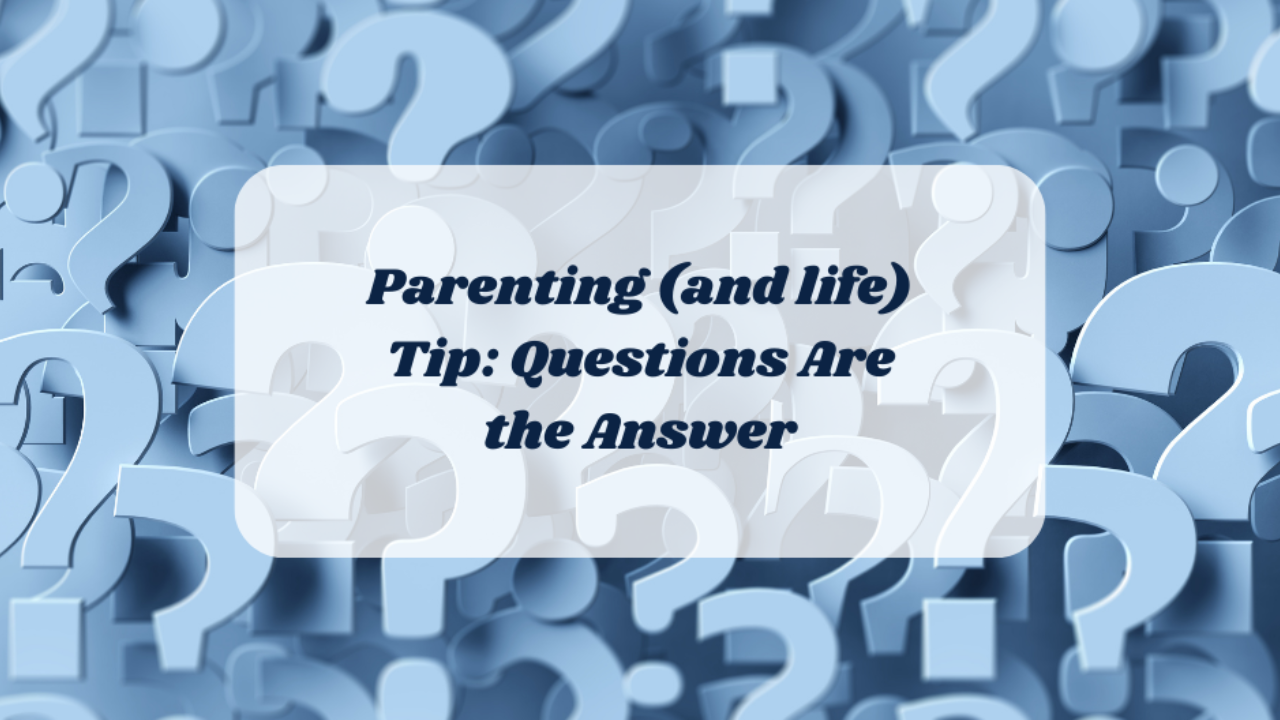Parenting (and life) Tip: Questions Are the Answer
Sep 12, 2023
Are you asking the right questions?
A couple weeks ago, I failed in this area with one of our teens (see my recent Instagram REEL), so I share the following with you in hopes of helping you learn from my mistake.
If you are a parent of children who will one day be teenagers, a parent of teens, a grandparent of teens, or someone who simply wants to level up your communication skills (a monumental key to success in all aspects of life), in order to be more useful to others personally and professionally, it’s imperative to understand that communication is the key, and we must be intentional about getting better.
We all ask and answer questions constantly, whether in our homes and our work, but have you considered the power of answering questions with questions?
It might sound counterintuitive, but this approach can be a game-changer in getting to the root of someone's concerns or inquiries.
Getting back to my mistake in this area with one of our teens a couple weeks ago…
When they asked my opinion about something, I simply answered the question directly, by giving my opinion, which was not bad or harsh or mean at all, but essentially ended the conversation that particular day.
I realized later, thanks to the insight from my son-in-law, Josiah, during a family conversation around the dinner table days later, that I had failed. I had failed to ask questions. I had failed to follow-up my answer to their question with a question.
Here’s some examples:
“Oh, I like it a lot, why do you ask?”
“I don’t really care for it at all. I’m curious though, why do you ask?”
“I think it’s great. Would you mind sharing why you ask?”
This is extremely important because whether we are dealing with teens, pre-teens, or other adults, oftentimes they are not able or willing to ask the real question they want the answer to.
It is our responsibility to ask good clarifying questions to:
- Show that we care,
- Show that we really desire to understand them and their perspective, and
- Be the best help we can be by getting them the real answers they are seeking (or need).
I envision it like peeling an onion. An onion has many layers. Often we must ask clarifying questions, to "peel the onion” so to speak, in order to help the other person get down to the core of what they are really wrestling with or attempting to understand.
Sometimes we can answer their question then immediately follow it with a question. Other times, depending upon the question and the situation, we should answer the question with a clarifying question directly.
Just yesterday someone asked me if my company was like another company. I did much better this time. Rather than answering the question that I assumed he was asking (thinking we know the real question being asked is where we get in trouble), I asked a clarifying question to determine what his real question was.
I said, “Well, they are both in the same industry, and they both have a similar business model, and both offer nutritional products, but they are also very different as well. Just like a Kia and a Corvette have some similarities (they both are cars, they both have four wheels, etc.) they also are very different. In what aspect are you wondering if they are similar?”
He then clarified his real question, allowing me to easily answer it.
When we engage in conversations, our goal should not merely be to exchange information, but also to understand the underlying motives and emotions driving the other person. This is where answering questions with questions comes into play. It allows us to dig deeper and uncover the true nature of the issue at hand.
One of my mentors, Jesus Christ, was a master at this. If we choose to learn from him, the greatest communicator of all time, we can see example after example of him answering questions with clarifying questions.
The following are some benefits I see of responding to a question with another question are as follows:
- It encourages the other person to elaborate on their thoughts and feelings. For example, if someone asks, "Why did you make that decision?" instead of immediately defending your choice, you can ask, "What specifically concerns you about that decision?" This shift in approach invites the other person to express their concerns more openly.
- It promotes critical thinking. It encourages both parties to explore different angles of a problem. When you respond to a question with a thoughtful inquiry, you challenge the other person to reflect on their own beliefs and assumptions, fostering a deeper and more constructive dialogue.
- Finally, questions can diffuse tension in difficult conversations. By responding with a question, you avoid the trap of defensiveness and instead create an atmosphere where both parties feel heard and respected. It can transform confrontations into collaborative problem-solving sessions.
Questions are indeed the answer when it comes to effective communication, so the next time you're faced with a question, consider whether answering with a question might be the key to unlocking a deeper and more meaningful conversation.
Listen to this week’s Life’s Hard Succeed Anyway podcast here.
Pre-order my new book here.


